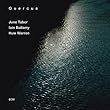 By Daniel Garrett
By Daniel Garrett
June Tabor, Iain Ballamy, Huw Warren, Quercus
Produced by Manfred Eicher, Bellamy, and Warren
ECM, 2013
“All that I have endured / Lassie my dearie / Here in thine arms is cured / Lassie lie near me” goes the third verse in “Lassie Lie Near Me,” a poem by Robert Burns sung by the highly regarded folk singer June Tabor in a low, deep, slow voice, accompanied by saxophonist Iain Ballamy and pianist Huw Warren, two longtime collaborators, on Quercus, the album that takes the name of the trio. “Fly away, fly away, breath: I am slain by a fair cruel maid,” sings June Tabor in Shakespeare’s romantic lament, to which the saxophone adds something modern and gracefully wandering, something free. The piano adds something too, the suggestion that life—delight, energy—goes on despite one person’s sorrow. “As I Roved Out” is a traditional melancholy poem about a broken promise, a love poem in which a man marries another woman for wealth in an England devoted to profit and war and lives to regret it, a song delivered in an austere but tragic tone, after a quiet but well-paced piano introduction. In the meditative sound given A.E. Houseman’s “The Lads in Their Hundreds,” a sound old and new, familiar and strange, there is a fair is attended by many young men: “And few that will carry their looks or their truth to the grave.” In the various lines are apprehensions of death in the supposed glory of war. In the instrumental “Teares,” the piano is impressive, playing its own counterpoint.
In the traditional “Near But Far Away,” a devoted woman, apart from her love, says, “In the middle of the ocean / There shall grow a myrtle tree / If ever I prove false to my love / To the man that loves me” and she warns other girls against false seductions. A young woman anticipates an August fair—one assumes that then as now fairs are held in country towns for entertainment, community, and business—and there the young woman expects to meet her love and does, and once together, she believes that they will never part. She gives solitary testimony, but the emphatic declaration makes one wonder if words of faith are there to beat back doubt in her, knowing desire is more fickle than love. In the lyric of “What Wants the Evening Rose?,” a Les Barker piece, there is the sense of the clash between virtue and experience, and pleasure and respect, in the description of gardens, flowers, walls, and night: “Twilight will not disclose / Who has done what with whom.”
After the opening by saxophone and piano, in the jazz interpretation of Mack Gordon’s “This Is Always,” the singing is first somber then light. “This is love / The real beginning of forever / This isn’t just mid-summer madness,” sings Tabor. The fast pace of the musical accompaniment recurs—excitement, improvisation. A dramatic recitation is made of David Ballantine’s “A Tale from History (The Shooting),” which could be about love or revolution or both, with sudden changes of fate, ambition, and betrayal, death, and regret. The last song, Gregory Norbet’s “All I Ask of You,” sounds like a lullaby more than a love song, although its rhythm is incantatory as it insists, “All I ask of you is forever to remember me as loving you.”
Daniel Garrett, a child of the American south, Louisiana, where he grew up reading, taking photographs, and enjoying fishing and a good summer barbecue, Daniel moved to New York and became a graduate of the New School for Social Research, was an intern at Africa Report, poetry editor for the male feminist magazine Changing Men, founded and acted as principal organizer of the Cultural Politics Discussion Group at ABC No Rio and Poets House, wrote about painter Henry Tanner for Art & Antiques, and organized the first interdepartmental environmental justice meeting at Audubon. Long interested in human complexity, intelligence, experiment, and cultural diversity, Garrett has researched various cultures, and he wrote about fiction and poetry for World Literature Today and international film for Offscreen, and has done music reviews that constitute a history of popular music for The Compulsive Reader. His work has appeared as well in The African, All About Jazz, American Book Review, Black Film Review, Cinetext, Contact II, Film International, The Humanist, Hyphen, Illuminations, Muse Apprentice Guild, Option, Pop Matters, Quarterly Black Review of Books, Rain Taxi, Red River Review, Review of Contemporary Fiction, and Wax Poetics. He returned to the south, where he worked on philosophical fiction, the novel A Stranger on Earth.